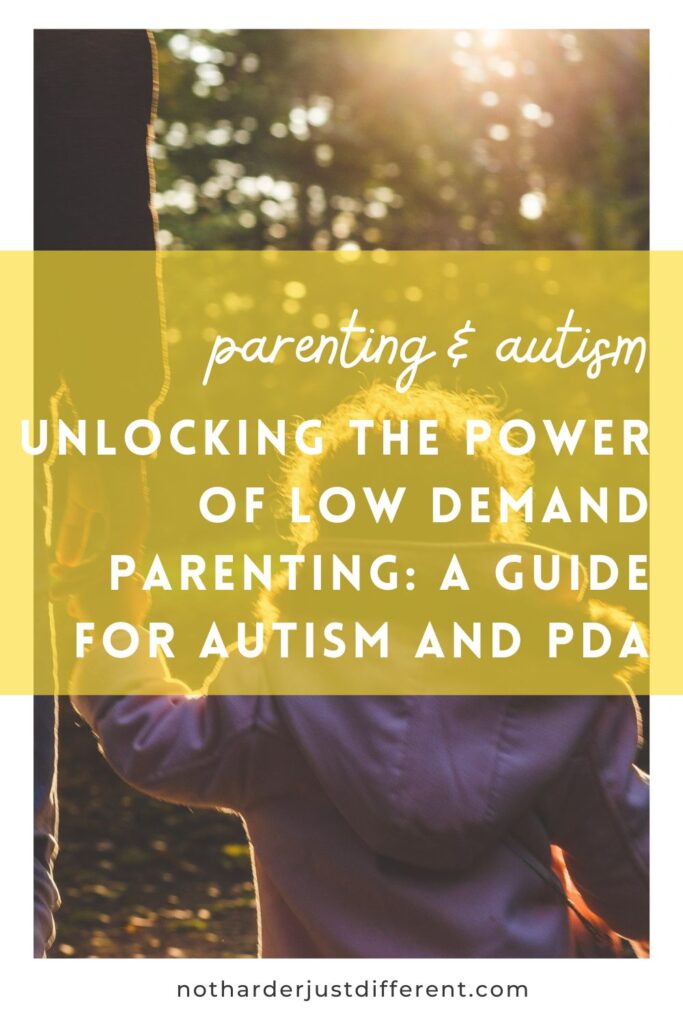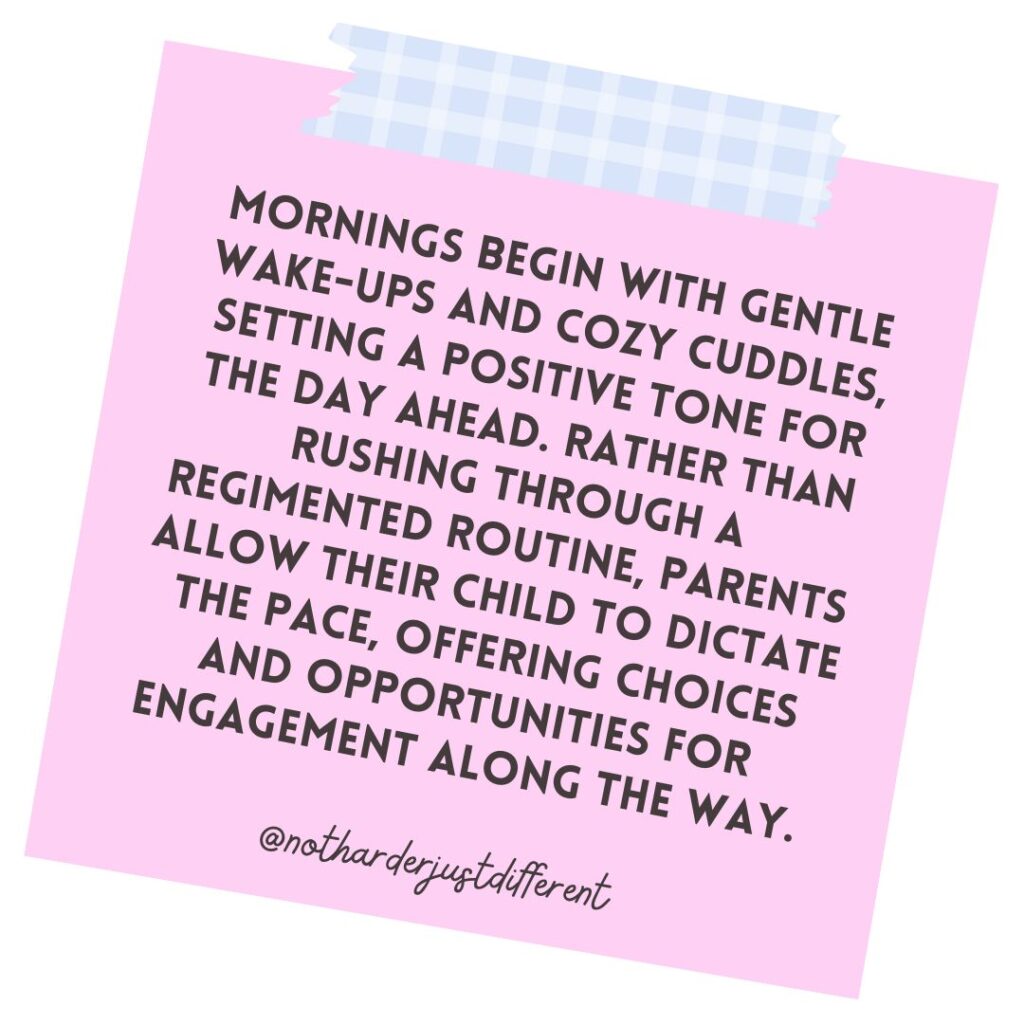Disclaimer: As a future Licensed Clinical Social Worker (LCSW) currently pursuing my master’s degree, I am passionate about sharing insights and information related to parenting, autism and homeschooling based on my personal experiences and research. However, the content shared on this blog is not intended to substitute professional advice, diagnosis, or treatment. Parenting is a deeply personal journey, and while I strive to provide valuable insights, every family and situation is unique. Readers are encouraged to consult with qualified professionals for personalized guidance tailored to their specific needs and circumstances.
Today, let’s chat about a parenting approach that’s been making waves in the autism community: low demand parenting. If you’ve heard the term buzzing around but aren’t quite sure what it entails, you’re in the right place!
Before diving into the depths of low demand parenting, it’s crucial to recognize that parenting a child with autism, especially one with Pathological Demand Avoidance (PDA), presents unique challenges and opportunities. These children often navigate a world that feels overwhelming and unpredictable, where even the simplest demands can trigger intense anxiety and distress. In such a landscape, traditional parenting approaches that rely on rigid rules and expectations may inadvertently exacerbate the child’s struggles, leading to power struggles and meltdowns.
However, amidst these challenges lies the promise of low demand parenting—a gentle, empathetic approach that honors the individuality and autonomy of each child. At its essence, low demand parenting is not just a set of techniques or strategies but rather a philosophy grounded in compassion and understanding. It acknowledges that children with autism, including those with PDA, possess unique strengths and challenges that require a tailored approach to support and nurture.
By embracing the principles of low demand parenting, parents can create a nurturing environment where their child feels accepted and valued for who they are. It’s about letting go of preconceived notions of what parenting “should” look like and instead embracing the beautiful messiness of raising a child with autism. It’s about celebrating small victories, fostering connections, and creating moments of joy amidst the chaos.

What is Low Demand Parenting?
Low demand parenting is a nurturing approach rooted in empathy and flexibility. Unlike traditional parenting methods that may rely heavily on rules and structure, low demand parenting emphasizes understanding and meeting the unique needs of each child, particularly those with autism, including Pathological Demand Avoidance (PDA). It’s about creating an environment where demands are minimized, and the focus is on fostering a sense of security and trust.
In low demand parenting, parents strive to tune into their child’s individual preferences, triggers, and communication styles. It involves recognizing and respecting the child’s boundaries while offering gentle guidance and support. This approach acknowledges that each child is different and may require varying levels of support and understanding to thrive.
At its core, low demand parenting is about building a strong foundation of connection and trust between parent and child. It’s about creating a safe space where children feel valued, heard, and understood. By embracing flexibility and empathy, parents can cultivate a nurturing environment that allows their child to flourish and reach their full potential.
Why is it Beneficial for Children with Autism, Specifically PDA?
For children with autism, especially those with Pathological Demand Avoidance (PDA), low demand parenting offers a sanctuary from the overwhelming demands and expectations of the world. PDA is characterized by an extreme aversion to demands and an intense need for control, which can often lead to high levels of anxiety and stress. In this context, low demand parenting becomes a lifeline, providing a framework that respects the child’s need for autonomy and minimizes triggers.
By reducing the pressure to comply with demands and instead focusing on building trust and rapport, parents can create an environment where their child feels safe and understood. This sense of security allows children with autism to explore and engage with the world at their own pace, free from the constant fear of failure or rejection.
Furthermore, low demand parenting encourages parents to view behavior through a lens of communication rather than defiance. It prompts them to seek underlying reasons for their child’s actions and emotions, fostering a deeper understanding of their needs and preferences. By validating their experiences and offering support without judgment, parents can empower their child to navigate the complexities of the world with confidence and resilience.

A Day in the Life of Low Demand Parenting
Imagine a typical day in the life of low demand parenting, where the atmosphere is infused with warmth, understanding, and collaboration. Mornings begin with gentle wake-ups and cozy cuddles, setting a positive tone for the day ahead. Rather than rushing through a regimented routine, parents allow their child to dictate the pace, offering choices and opportunities for engagement along the way.
Meal times become opportunities for exploration and connection, with children encouraged to participate in meal preparation and decision-making. Transitions between activities are approached with patience and flexibility, with parents offering gentle prompts and support as needed. Throughout the day, parents remain attuned to their child’s cues, adjusting their approach based on their individual needs and preferences.
Evening routines are relaxed and unhurried, with bedtime rituals designed to promote a sense of calm and security. By prioritizing connection and emotional well-being throughout the day, parents lay the groundwork for a restful night’s sleep, knowing that their child feels loved, supported, and valued.
Commonly Asked Questions
Q: Is low demand parenting permissive?
A: Not at all! Low demand parenting is about finding a balance between support and structure, prioritizing the emotional well-being of the child while maintaining necessary boundaries.
Q: Will my child become spoiled or unmotivated?
A: Quite the opposite! By fostering a secure and trusting relationship, children are more likely to develop confidence, resilience, and intrinsic motivation to explore and learn at their own pace.
Q: Can I still set limits and expectations?
A: Absolutely! Low demand parenting encourages clear and consistent communication of expectations, but in a way that respects your child’s individual needs and capabilities.

